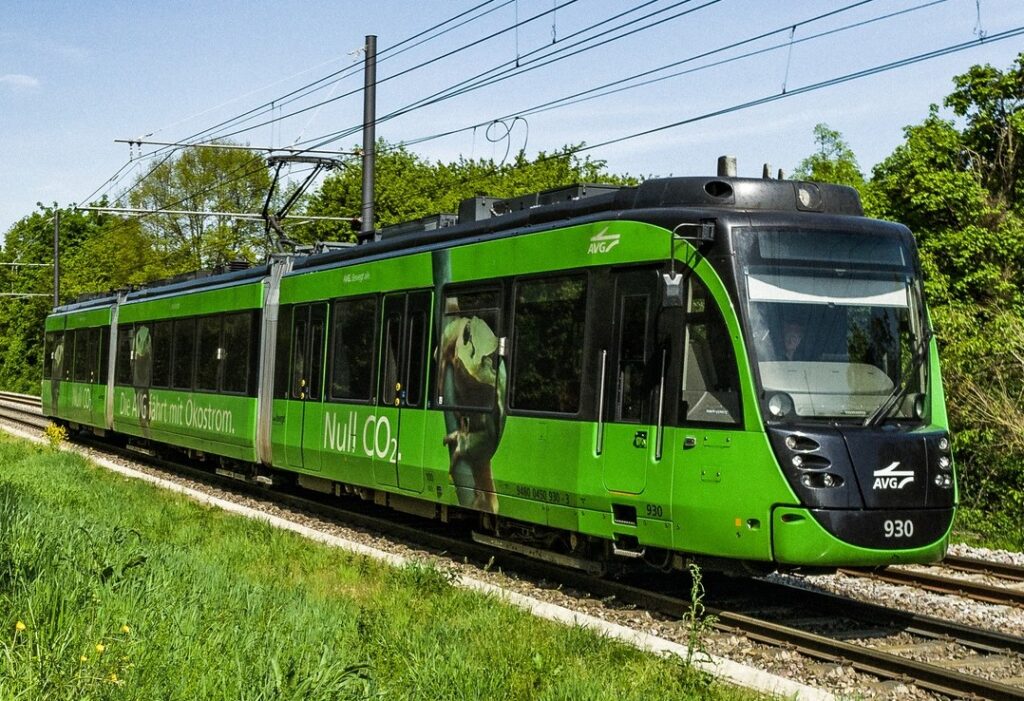LogIKTram joint project targets logistics concept and ICT platform for freight transport in tram and light rail vehicles – Karlsruhe region acts as model region

The aim of LogIKTram is to shift more freight traffic onto the railways – and thus contribute to a better transport climate balance. (Photo: Paul Gärtner, KVV)
Shifting more freight traffic from road to rail, even on medium and short distances, is the goal of the new joint project LogIKTram. To provide electric mobility solutions for commercial logistics in cities and regions, the project uses the existing streetcar and rail infrastructure of the “Karlsruhe Model”. To this end, the Karlsruhe Institute of Technology (KIT), MARLO Consultants, Offenburg University of Applied Sciences, DB Engineering & Consulting, and industrial partners are working closely with Albtal-Verkehrs-Gesellschaft (AVG) to develop a vehicle technology and logistics concept for a “freight streetcar” based on a Karlsruhe dual-system light rail system and are investigating the impact on road and rail traffic. Another central aspect of LogIKTram is the development of ICT for planning and controlling the logistics and operation of the freight streetcar, with which MARLO Consultants, INIT, SimPlan and FZI are involved. LogIKTram is part of the overall regioKArgo initiative, some of whose partners are also in the LogIKTram consortium and want to research and implement new forms of cross-modal freight and delivery traffic.
In the future, it will be important to get more freight traffic onto the railways in order to improve the transport climate balance and relieve the cities. Combined transport by rail currently moves mainly between the major freight terminals or to and from seaports. In the cities and urban agglomerations, rail freight transport has hardly played a role to date. There, small-scale transports travel by road, for which new concepts are needed. The LogIKTram joint project, in which AVG, KIT, Offenburg University of Applied Sciences, MARLO Consultants, and DB Engineering & Consulting are leading participants along with several other partners, aims to develop a logistics concept and an information and communication technology (ICT) platform for future freight transport in streetcar and light rail vehicles. “In the target state, we use the existing streetcar and rail infrastructure,” explains Dr. Michael Frey, deputy institute director at the Institute of Vehicle Systems Technology (FAST), KIT’s Vehicle Systems Technology division. The FAST’s Railway Systems Engineering Division and KIT’s Institute of Transportation (IfV) are also involved in LogIKTram.
The project started on March 1, 2021 and is scheduled to run for three years. LogIKTram is receiving funding totaling around 2.75 million euros from the German Federal Ministry for Economic Affairs and Energy (BMWi). LogIKTram is a fundamental sub-project of the overall regioKArgo initiative, which has set itself the goal of investigating and implementing new forms of goods loading and delivery traffic in Karlsruhe and the surrounding region. The aim of regioKArgo is to shift more traffic from road to rail in the future and to make the last mile of deliveries emission-free. “The existing infrastructure of the ‘Karlsruhe Model’ offers optimal conditions for developing new forms of freight transport and testing them in practice,” says Ascan Egerer, AVG’s technical managing director.
Freight streetcar transports people and goods
The LogIKTram project pursues several sub-goals. For example, the researchers at FAST of KIT are developing the technical concept for a “freight streetcar” based on a dual-system light rail system according to the “Karlsruhe Model”, which has combined streetcar lines in the city and rail lines in the surrounding area for almost 30 years already. For this purpose, the Albtal-Verkehrs-Gesellschaft (AVG) is providing an older vehicle, which will be specially adapted to the requirements of transporting goods and tested as an initial demonstration object. “A further sub-project called regioKArgoTramTrain is intended to build on this and enable the new train to be used not only on a test basis at the depot, but also in real operation in the region – to this end, we have applied for funding in the state competition RegioWIN,” says Ascan Egerer. Before the system can be put into operation, further tasks will have to be carried out in the areas of traffic concept, rail operations, design of the handling processes and legal principles.
Variable interior design creates space
To enable the goods streetcar to transport both people and goods, FAST is developing solutions to create space for the goods by variable interior design. The transport containers are to be loaded and unloaded automatically and secured via devices such as hooks and latches. Precise positioning of the trains at the stations is important in order to move the transport containers with centimeter accuracy and to meet the normal passenger changeover times for passenger services. “The existing timetables are to be maintained,” explains Dr. Michael Frey from KIT’s FAST.
Simulation of passenger and freight transport in the region
KIT’s IfV is investigating the effects of the concept on road and rail transport. To this end, the scientists are building a simulation environment for passenger and freight transport in the Karlsruhe model region based on the mobiTopp transport demand model developed at IfV. Based on this, the IfV is investigating various operating scenarios of the LogIKTram and their traffic effects. “The aim of the project is to make sensible use of rail transport capacity in a time-dependent manner. In doing so, it is important to consider the requirements of both passenger traffic and freight traffic and to combine the two. With the combined passenger and freight traffic model to be created in the project, it will be possible for the first time to evaluate scenarios that optimize the utilization of rail vehicles with passenger and freight traffic in order to develop sustainable, environmentally friendly concepts that relieve road traffic,” explains Dr. Martin Kagerbauer, member of the institute management at KIT’s IfV.
Logistical and technical requirements are incorporated into ICT platform
MARLO Consultants, DB Engineering & Consulting and Offenburg University of Applied Sciences are contributing their expertise and detailed preliminary work to the development of the commercial urban logistics, planning and operator concepts. In collaboration with MARLO Consultants and INIT, the FZI Research Center for Information Technology will develop the derivation of requirements from the developed use cases and transfer them to the design of the ICT platform. The ICT platform will support the simulation of vehicle, automated load handling, journeys to evaluate the LogIKTram concept, and the logistical and railroad planning and control processes. In cooperation within the regioKArgo overall initiative, it is planned to carry out numerous information activities and ensure dialog with stakeholders and the public as well as technology and knowledge transfer locally and also to other regions.
The consortium is made up of the Albtal-Verkehrs-Gesellschaft (AVG) as the lead company, the Karlsruhe Institute of Technology (KIT), the Offenburg University of Applied Sciences, the FZI Research Center for Information Technology, and the companies MARLO Consultants, SimPlan, INIT, and Thales Deutschland. DB Engineering & Consulting is represented by experts from Karlsruhe and Berlin on the subject of logistics and operator concepts as well as on the conception of the freight tram system with its rail technology and logistics expertise. Various logistics companies as well as e-mobil BW, the state agency for new mobility solutions, and Automotive Baden-Württemberg are involved as associated partners.
